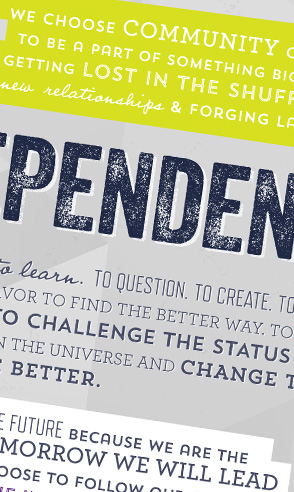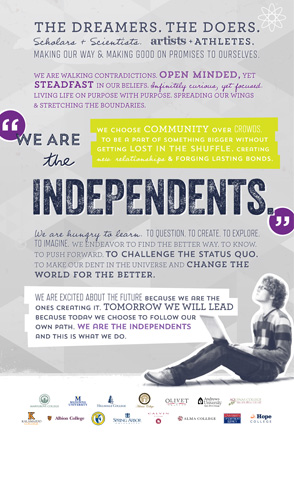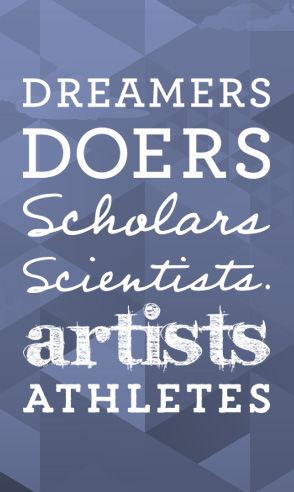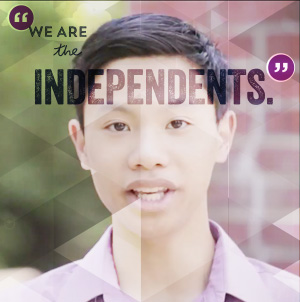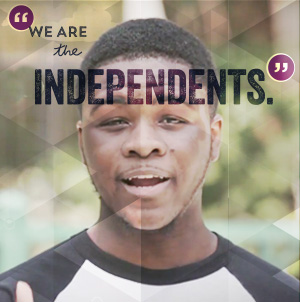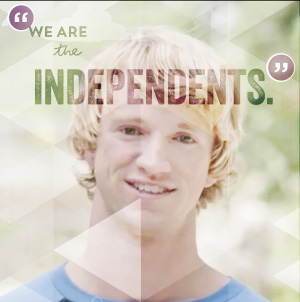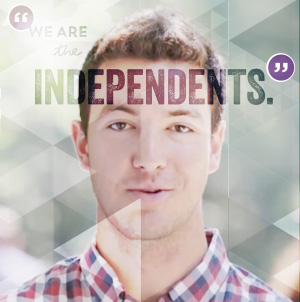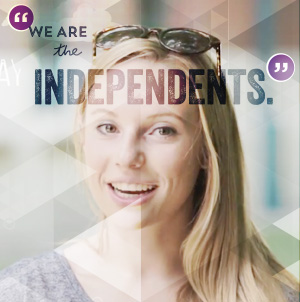Archive for October 2018
Major Gift to Albion College Will Transform U.S. Pre-Medical Education
The Wilson Institute for Medicine, created through a $5.1 million gift from Lisa and James Wilson, ’79 ’77, will empower faculty across disciplines to meet head-on the rapidly evolving medical-school landscape.
Through updates and enhancements to the curriculum, Albion will be at the vanguard of American pre-med programs.
With medical education’s significant changes in the 21st century—recalibrating to give increased emphasis to the discipline’s universal human and social aspects—there is growing concern in the field that the core pre-medical curriculum, virtually unchanged for decades, must similarly adapt.
Some say the need is urgent. And a major gift to Albion College will put the liberal arts institution out in front nationally, leading the way in closing the undergraduate preparation gap.
In what amounts to a $5.1 million statement, Dr. James Wilson, ’77, and Lisa Wilson, ’79, have established the Lisa and James Wilson Institute for Medicine at Albion College. It’s the largest gift by an individual or couple in the history of the College, which quickly has seen a distinct goal emerge on campus as it forms plans and action steps for the months and years ahead.
“It’s time for us to once again take the lead in innovating pre-medical education,” said Dr. Mauri Ditzler, president of Albion College. “Medical schools have changed dramatically in the last decade. We need to make certain that pre-medical education keeps up with that. We’ve always been a leader in this field; it’s time for us to be a role model.”
An evolution from the former Institute for Healthcare Professions, the Wilson Institute for Medicine will rethink and advance undergraduate teaching and preparation so that all Albion students who aspire to become physicians can realize their dreams in a fast changing medical-education environment. Through updated and more pertinent pre-med and pre-health coursework, Albion students will have a competitive advantage in gaining entrance to top-tier medical schools and in their overall career paths.
“People have been thinking about this idea for a while, but no one has really tackled it yet,” said Dr. Bradley Rabquer, associate professor of biology and director of the Wilson Institute for Medicine. “As the MCAT has changed, as medical schools have revamped their curricula, there is this large gap at the pre-med side, in the undergraduate curriculum. So we’re really striking while the iron is hot. The opportunity now is great.”
Increasingly, medical schools are incorporating patient care and interaction—traditionally the focus of the later clinical years—into the curriculum’s first two years, which previously had been dominated by “heavy, hard sciences” according to Rabquer. Today, he said, “there is more exposure to patients earlier, an emphasis on caring for people right at the start.”
This fall, a group of 10 faculty from the departments of Anthropology and Sociology, Biology, Chemistry, Mathematics and Computer Science, Physics and Psychological Science will review changes in medical school curricula, read current literature on some of the resulting outcomes, and begin to merge those findings with current best practices in undergraduate teaching. Following that pedagogical groundwork, the professors will move into course development in the winter and spring, Rabquer said, “so that we can roll out some new integrated, novel courses in time for the fall 2019 semester.”
The Institute, and Albion’s intentions, are already being noticed at the medical-school level.
“The practice of clinical medicine has changed dramatically in the last 20 to 30 years,” said Dr. James Woolliscroft, professor of medicine and former dean of the University of Michigan Medical School. “And yet when you think about the whole preparation that students go through in their undergraduate years, it hasn’t changed that much. Prerequisites to most medical schools have remained essentially constant for over a hundred years despite dramatic changes in the practice of medicine and the scientific basis thereof.
“It’s very timely that this is being looked at and readdressed,” Woolliscroft continued. “I see Albion leading what will hopefully be a national movement of liberal arts colleges who are intent on preparing their students not for the past, but for the future.”
The gift follows several years of conversation between Albion faculty and the Wilsons, acknowledging a gap that appeared to be widening in the discipline and tapping into their passions and expertise to do something about it.
“We’re at a time in the whole ecosystem of medical schools and colleges and residency programs where this kind of change would be welcome,” said Dr. Wilson, Rose H. Weiss Orphan Disease Center director’s professor and director of the gene therapy program at the University of Pennsylvania’s Perelman School of Medicine. He received his M.D. and Ph.D. from the University of Michigan after graduating Phi Beta Kappa with a B.A. in chemistry from Albion. “I’m confident that the Albion College community will have the resolve and the agility to be able to move in this very different and transformative direction.”
“Over the years, I’ve gotten to know many of the students Jim has taught who have worked in his lab, and I saw their struggles and I saw how difficult it was for them,” said Lisa Wilson, who after receiving her B.A. in economics and management from Albion worked in hospital administration for a number of years. “What I hope the Institute accomplishes is that every pre-med student at Albion College who qualifies and works really hard reaches their dream to become a doctor.”“Our hope,” Jim added, “is that with the kind of resources we can bring and leverage to bring in other resources, we can enable this to happen.”
And Albion College, its president added, is the ideal place to fulfill the vision.
“A liberal arts college like Albion is nimble. We can make changes in a year or two that a bigger institution might take a decade to accomplish,” said Ditzler, himself a chemist by training. “The innovative work we’re doing in pre-medical education through the Wilson Institute should not be underestimated. This is a fundamental change in the way we and others will think about preparing students to become doctors. But it’s something that we’re well prepared for. The faculty and staff from all over the institution, as well as our alumni, are committed to making this work.”
Alma College Alternative Fall Breaks Include Local Service Options
Students learn about the impact of genocide, interact with special needs youth, remove invasive shrubs and participate in wildlife rehabilitation during Alma College’s Alternative Fall Break.
Alma College’s mission is to prepare graduates who think critically, serve generously, lead purposefully and live responsibly as stewards of the world they bequeath to future generations. Students of Alma College strive to take this mission statement and transform it into a way of living. One example of these efforts is the nearly 200 students who participate in the Alma College Alternative Break Program.
This program began in 2003 as a single service trip with 20 participants. Students now participate in 10 or more volunteer opportunities throughout the course of the academic year.
Alma College had the third highest percentage of alternative breakers last year according to the Break Away national survey. A total of 193 schools responded to this survey hosted by the national organization supporting the development of alternative break experiences.
Alternative Fall Breaks offer several one- or two-day trips across the State of Michigan. Meanwhile, the holiday and spring service options allow students to serve throughout the nation for an entire week. More information on fall service and upcoming trip options can be found at https://www.alma.edu/academics/experiential-learning/leadership-programs/alternative-breaks.php.
“I went on my first Alternative Break in the spring of 2017. The destination was Mammoth Caves National Park and the experience was wonderful,” says program student co-leader Erin Goggins of Hastings. “Learning about the environment, making new friends and serving others have made this program extremely important to me.”
“Helping others become active citizens in the community is something else that I find especially great about organizing these trips,” says Goggins. “I am thankful that Alma College has provided me with the opportunity to do this.”






